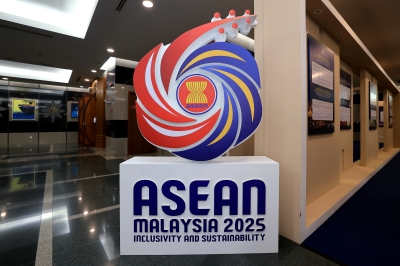MARCH 23 — Malaysia assumes the Asean Chairmanship in 2025, a crucial opportunity to influence regional policies on two pressing issues: the Rohingya crisis and the South China Sea dispute.
Putrajaya’s ability to address these challenges will define its leadership and Asean’s future credibility.
The Rohingya crisis: A humanitarian test
The Rohingya crisis remains a dire humanitarian issue, with over a million refugees displaced, mostly in Bangladesh. Asean’s response has been criticised for its slow and ineffective approach, largely due to its non-interference principle.
Malaysia has historically been vocal about the Rohingya plight. In 2016, then-Prime Minister Najib Razak condemned Myanmar’s actions as “genocide”. More recently, Malaysia has called for stronger humanitarian efforts. However, rhetoric alone is insufficient.
To make a real impact, Malaysia should first enhance Asean’s Humanitarian Mechanism. This could be done by strengthening the Asean Coordinating Centre for Humanitarian Assistance (AHA Centre) to deliver aid more effectively. Secondly, efforts should be made to increase diplomatic pressure on Myanmar via dialogue partners such as the US, China, and the EU to push for a stronger response.
Thirdly, Malaysia could propose a regional refugee framework jointly developed with Indonesia and Thailand – three nations that receive the most refugees from the inhumane exodus in Myanmar, to establish a structured resettlement plan, easing the burden on Bangladesh.
Failure to address this issue decisively could further damage Asean’s credibility in handling humanitarian crises.
The South China Sea: A delicate balancing act
The South China Sea remains a geopolitical flashpoint, with overlapping territorial claims involving China, Malaysia, the Philippines, Vietnam, and Brunei. Malaysia has traditionally adopted a cautious yet firm stance, balancing national interests while maintaining economic ties with Beijing. While Malaysia values its economic relationship with China, it must also ensure that its sovereignty and territorial rights in the South China Sea are not compromised.
During its 2015 chairmanship, Malaysia played a key role in reviving discussions on the Code of Conduct (CoC) in the South China Sea. However, progress on the agreement has since stalled due to ongoing disputes and China’s increasing military expansion in the region. As Malaysia prepares to take on the Asean Chairmanship in 2025, it must push for decisive action to ensure regional stability and safeguard its national interests.
One of Malaysia’s top priorities should be finalising the Asean-China Code of Conduct, ensuring that the agreement is legally binding and enforceable. A strong and effective CoC would help establish clear guidelines for resolving disputes, preventing further escalation of tensions.
In addition, Malaysia should work towards strengthening maritime security cooperation among Asean claimant states. This could be achieved through joint patrols and intelligence-sharing initiatives to enhance regional security and deter aggressive manoeuvres by external powers.
At the same time, Malaysia must engage with global stakeholders to maintain a balanced foreign policy. While preserving its economic ties with China, it should also strengthen security relationships with the US, Japan, and Australia. These partnerships could provide Malaysia and Asean with greater leverage in negotiations and ensure that the region remains free from external domination.
China has long preferred bilateral negotiations over Asean’s multilateral approach, a strategy that weakens regional unity and gives China greater leverage over individual states.
Should Malaysia fails to navigate these tensions carefully, Asean risks becoming further divided on the issue. As the incoming Asean Chair, Malaysia must demonstrate strong leadership in ensuring that Asean remains united in its stance and that regional interests are not overshadowed by great-power rivalries.
Lessons from the Malay Sultanates’ diplomatic history
Malaysia’s approach to diplomacy can draw inspiration from the Malay sultanates of the past, which successfully engaged in foreign relations with powerful nations. The Malacca Sultanate, for instance, maintained diplomatic ties with China, fostering a relationship that ensured protection from hostile powers while enhancing trade. Malacca’s role as a major trading hub was strengthened through agreements with Arab and Indian merchants.
Similarly, the Johor Sultanate navigated diplomatic challenges by engaging with both the Portuguese and the Dutch, securing alliances that influenced regional politics. Johor played European powers against each other to maintain its autonomy, demonstrating strategic diplomatic acumen. By carefully balancing relations with regional and global actors, Johor ensured its survival despite external pressures.
Kedah, despite being under constant threat from Siam and Burma, managed to survive through astute diplomacy. Despite being invaded and displaced in 1841, the Sultan of Kedah was able to retain his throne through a combination of diplomatic efforts, strategic patience, and local resistance against Siamese rule. This highlighted how smaller states in the Malay world navigated powerful regional forces through negotiation and political resilience. By maintaining tributary relations with Siam while also seeking protection from the British, Kedah was able to retain a degree of autonomy. The sultanate’s ability to manoeuvre between larger regional powers ensured its survival well into the colonial era. Kedah’s independence remains to this day as part of modern Malaysia.
These historical examples underscore the importance of balancing power dynamics through negotiation and diplomacy, a lesson Malaysia can apply in managing Asean’s modern geopolitical challenges.
The Asean 2025 logo is seen at Wisma Putra in Putrajaya on Oct 22, 2024. — Bernama pic
Will Malaysia deliver?
Malaysia’s 2025 Asean Chairmanship presents a pivotal moment for its regional leadership. Strong action on the Rohingya crisis and the South China Sea dispute would enhance its standing and strengthen Asean’s credibility. A passive approach, however, risks reinforcing the perception of Asean as a divided and ineffective bloc.
Success in these areas could redefine Asean’s global role, while failure could deepen instability in the region.
The world will be watching Malaysia’s next move.
* Dr Mohd Hazmi Mohd Rusli is associate professor at the Faculty of Syariah and law, Universiti Sains Islam Malaysia and a research associate at the Asian Institute of International Affairs and Diplomacy (AIIAD), Universiti Utara Malaysia.
** This is the personal opinion of the writer or publication and does not necessarily represent the views of Malay Mail.





